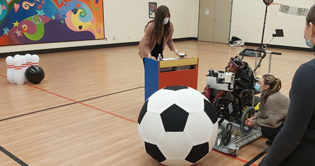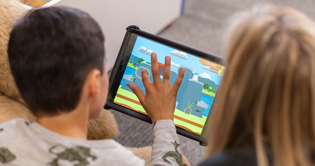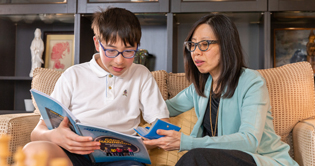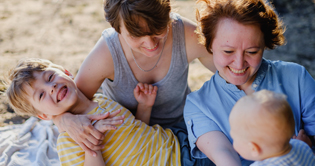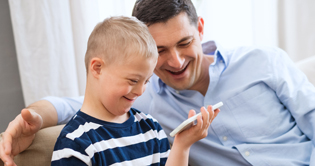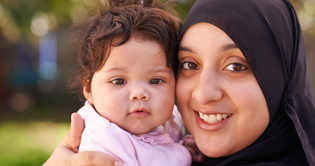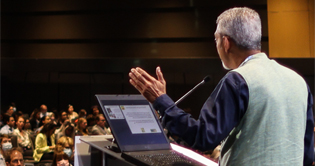At least
48 family advocates
partnered in research and implementation
projects in 2022-23
At least
284 frontline workers
contributed their time and skills
to these projects
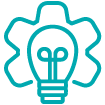
At least
35 Indigenous researchers
contributed their time and
expertise
Translating science into better outcomes
Kids Brain Health Network enables transformative research that improves outcomes for children with NDDs and their families, setting them up for lifelong well-being, inclusion and achievement.
In 2022-23, the network focused on strengthening implementation knowledge and skills across its research programs. As a result, more sites than ever are applying KBHN-supported solutions, which help with issues ranging from physical function to mental health, from educational support to quality of healthcare.
Early Identification Projects
Early Detection and
Intervention Toolkit for
Cerebral Palsy (EDIT-CP)
A knowledge-implementation project that helps medical professionals detect and treat cerebral palsy sooner

According to international guidelines, doctors should ideally diagnose cerebral palsy (CP) before a baby’s first birthday. This way, the child can access early interventions that will help them reach their fullest potential for movement and function. However, the average age for a CP diagnosis in Canada is 18.9 months.
To address this shortcoming, EDIT-CP project is supporting the adoption of an examination called the HINE in Canadian neonatal follow-up programs, which monitor infants who are at high risk of developmental conditions. This year, for example, the team organized webinars that trained over 400 physicians to detect probable CP using the HINE.
Finally, they are helping to build capacity for early interventions, with a particular emphasis on Baby CIMT, a treatment that is often helpful for a common kind of CP.
Genetic Screening for FASD Risk
A genomic assessment tool to identify infants and young children who are at risk of developing Fetal Alcohol Spectrum Disorder (FASD)

Principal investigators
Dr. Geoff Hicks, University of Manitoba
Dr. Brenda Elias, University of Manitoba
Dr. Paul Pavlidis, University of British Columbia
Frank Turner, Cree Nation Tribal Health Services
These researchers are developing a screening method called FASD Code. It involves cheek swabbing and saliva sampling to test for changes that may occur throughout the genome after prenatal alcohol exposure. This makes it a simple, cost-effective way to identify young children who may turn out to have fetal alcohol syndrome disorder. Given that children are usually school-aged before they get a diagnosis, this innovation could allow families and service providers to understand and address a child’s challenges sooner.
For a study co-designed and led by the Cree Nation Tribal Health Centre, community clinics in several remote First Nations communities are implementing FASD Code and helping to evaluate it. The Manitoba FASD Centre is also participating in implementation research.
The Infant and Early Mental Health (IEHM) Hub for Training, Resources, & Tools
A one-stop-shop for practitioners to access resources on infant and early mental health

Principal investigators
Dr. James Reynolds, Queen’s University
Dr. Chaya Kulkarni, The Hospital for Sick Children
Mental health is crucial for people of all ages, and especially young children, because their brain development is the most active by far. The Infant and Early Mental Health Hub aims to improve young kids’ socioemotional development by enhancing the skills and knowledge of the practitioners who work with them, including social workers, early-childhood educators, home visitors and medical staff.
The IEMH Hub’s rich and growing pool of resources include a free webinar that introduces the basic concepts of infant mental health, “pathways of care” that allow families and practitioners to find appropriate children’s mental-health services in their geographic areas, and Nurturing the Seed, a culturally sensitive developmental-support program created in consultation with Indigenous communities across Canada.
This year, 2,100 people attended the hub’s latest lecture series, while an additional 1,900 participated in other kinds of training. As they go along, the project’s investigators are learning about the hub’s usefulness for its users and how it has impacted their work with children and families.
Early Intervention and Effective Treatment Projects
The Babbly Application
An evaluation of an app that helps parents to promote kids’ speech and language development

Principal investigators
Dr. Anna McCormick, Children’s Hospital of Eastern Ontario
Dr. Christopher Fennell, University of Ottawa
The Babbly app uses machine learning to analyze recordings of a child’s voice and to assess their speech and language development. It also provides targeted speech-promoting activity suggestions. Designed to be fun and easy to fit into everyday routines, these activities give parents the chance to participate in their child’s learning. KBHN’s research is focused on finding out whether Babbly could help families who are waiting for speech and language evaluation and services, which can take up to a year or more to access in Canada.
Brain-Computer Interface (BCi) Move
An exploration of kids’ potential to gain mobility through brain-computer interfaces
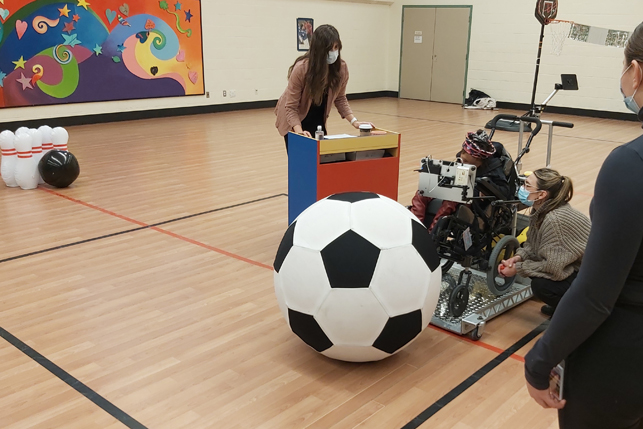
Principal investigators
Brain-computer interfaces (BCis) recognize changes in thought patterns through a non-invasive headset and transmit those signals to electronic devices. A child could think the word “go,” for example, to move a scooter forward. The BCi-Move project aims to determine if children with severely limiting physical disabilities can use this cutting-edge technology to achieve personalized mobility goals. Its findings could lay the groundwork for independent play and the use of electric wheelchairs in everyday life.
Participating kids are using BCI training devices to perform playful activities tailored to their goals and interests. Preliminary results suggest that this personalized approach turns learning to use BCI into a fun, motivating experience and measurably improves kids’ ability to control their own mobility.
Dino Island
A therapeutic game that improves attention, short-term memory and other skills in children with neurodevelopmental disabilities
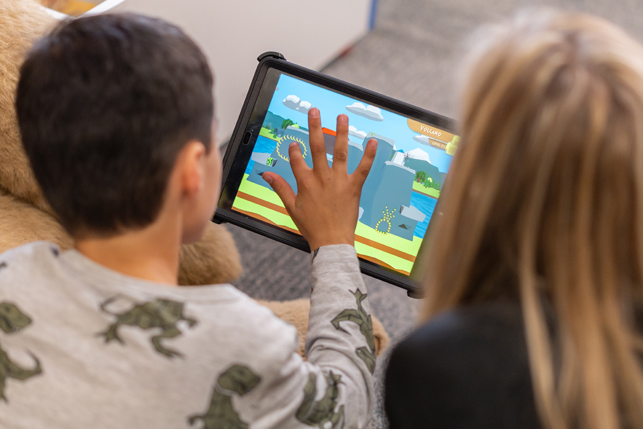
Principal investigators
Dino Island is a tablet-based game designed specifically for children with neurodevelopmental disabilities (NDDs). Studies in children with autism, fetal alcohol syndrome disorder and attention-deficit/hyperactivity disorder have shown that it helps with attention, memory, self-regulation, emotional and behavioural control, self-confidence, problem-solving strategies and academic performance. A companion website trains therapists, teachers or parents to support children in playing the game and applying the skills it strengthens to other areas of life.
Through several studies involving hundreds of children in total, this project is expanding Dino Island’s impact in home, community, clinical and school settings across Canada and internationally. In tandem, the investigators are refining Dino Island to maximize its usability, testing its ability to help with diagnoses such as brain injury, evaluating the feasibility of remote delivery, and taking steps towards commercializing the game so that it can remain available indefinitely.
eHealth for Neurodevelopmental Disorders
A suite of online interventions, one of which helps children with neurodevelopmental disabilities (NDDs) to achieve a good night’s sleep. The other one helps classroom teachers meet the needs of students with NDDs.

Principal investigators
Dr. Penny Corkum, Dalhousie University
Dr. Shelly Weiss, University of Toronto
This project encompasses two online programs. The first addresses the fact that children with NDDs have an increased risk of struggling to fall and stay asleep. This sleep disruption can affect their ability to feel well and do their best during the day. Better Nights, Better Days for Children with Neurodevelopmental Disorders (BNBD-NDD) is an e-health intervention that helps parents to improve kids’ insomnia.
ASSIST (Accessible Strategies Supporting Inclusion for Students by Teachers) helps teachers to support students with NDDs. This meets a crucial need: most mainstream classroom teachers report they don’t have adequate training to work effectively with this group of kids, despite growing demands upon them to do so.
The project’s team is conducting implementation studies to learn about the barriers and facilitators that help or hinder teachers and parents when it comes to using these programs effectively. The ASSIST study has engaged 333 educators while the BNBD study involves 195 families.
The researchers are gathering information from participants that will help them launch BNBD and ASSIST commercially; for example, they’re collecting data about which prices users would be willing and able to pay. They’ll be using the resulting income to sustain and update the programs over time.
Intelligent Device for Sound Sensitivity
A programmable device that will filter the soundscape for children with sound sensitivity and send a tolerable version of it into their headphones

Principal investigators
Dr. Elina Birmingham, Simon Fraser University
Dr. Siamak Arzanpour, Simon Fraser University
Many children living with autism are hypersensitive to certain sounds. Schools’ approaches for accommodating sound sensitivity include letting students wear earplugs or earmuffs or allowing them to take breaks in a quiet area. Because such strategies block or avoid all sounds indiscriminately, they interfere with the child’s full participation in class and other activities.
This team of researchers is developing a device that selectively filters or reduces specific noises that a child finds distressing (e.g., dogs barking, sirens, jackhammers) while allowing them to hear other sounds, such as the teacher’s voice. This project’s current goals are to test prototypes in virtual and in-person settings, to make improvements based on feedback and to plan for widescale commercialization.
KidsAction Coaching
An approach to coaching that ensures kids with neurodevelopmental disabilities (NDDs) can participate in physical-activity programs in their communities
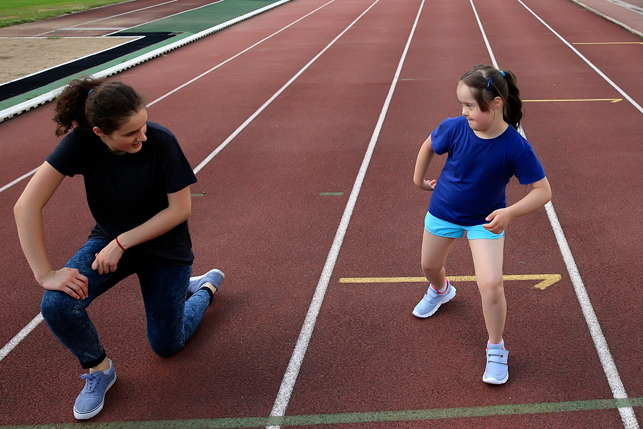
Principal investigators
Participating in sports and recreation brings a whole host of benefits to kids with NDDs, including the development of healthy lifestyle habits, self-esteem, self-control, physical abilities and social skills. However, community programs are often designed without them in mind.
KidsAction Coaching (KAC) helps programs become more accessible to all. It’s an approach that involves understanding each child’s specific abilities, adapting activities as needed and highlighting progress. KidsAction Coaching also engages children’s families: coaches give parents a personalized list of activities they can practice with their child at home, along with access to instructions and videos.
This team is developing KAC’s website and training materials for coaches, families and organizations, as well as culturally adapted resources that can be used in Indigenous communities. They’re also building partnerships with physical-activity programs across the country. Notably, the Challenger Baseball programs run by the Jays Care Foundation implemented KAC this year.
The Math Interactive Learning Experience (MILE) for the Classroom
An intervention that addresses the core deficits that often underlie math difficulties, such as working memory and self-regulation

Principal investigators
Dr. Jacqueline Pei, University of Alberta
Dr. Carmen Rasmussen, University of Alberta
What it is
Originally developed for children with fetal alcohol syndrome disorder, MILE is an evidence‐based intervention geared toward building the underlying cognitive skills that are critical to math. Not only do math skills improve, but also behavioural functioning in the classroom. This creates a foundation for later success in math—and school more generally.
MILE was originally a tutoring program that relied on individual or small-group instruction, which can be a tall order for schools with limited resources. To make MILE less costly to adopt, and to provide a more inclusive classroom experience, this research team adapted it for teachers to use with all the children in their class, including those with gaps in their understanding in math. They are now implementing this version of MILE in participating school divisions across Alberta and measuring its effectiveness.
They’re also building a MILE website and community of practice in partnership with the Edmonton Regional Learning Consortium, an organization that has agreed to train and support even more classroom teachers going forward.
Secret Agent Society
A spy-themed life-skills program that helps school-aged children with autism to “crack the code” of emotions and social interactions
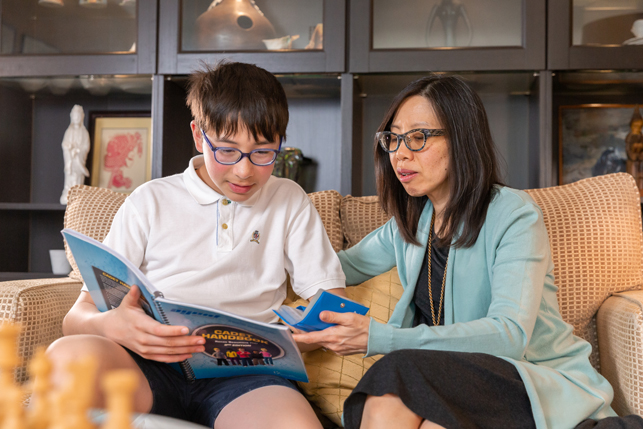
Principal investigators
Dr. Vivian Lee, Carleton University
Dr. Ariel Cascio, Central Michigan University
Dr. Jonathan Weiss, York University
Children with autism often have challenges with social skills and emotional regulation, which increases their risk of mental-health issues such as depression, anxiety disorders and behavioural challenges. The Secret Agent Society: Small Group Program (SAS: SG) digital software provides fun espionage-themed activities and tools including a digital board game, role playing and a computer game. It targets core areas of difficulty for kids with autism, such as developing desired friendships, working in teams and problem-solving. SAS:SG also helps children recognize emotions, express them in helpful ways and cope with challenging ones.
Previously, this team had shown that SAS:SG is feasible and useful when delivered by autism-focused service providers. However, to reach all the kids who need programs like Secret Agent Society, not only autism centres but also publicly funded mental-health centres should be able to offer them.
Therefore, the researchers trained 25 staff from five agencies in the Ottawa area to deliver SAS:SG. These facilitators are participating in a study evaluating whether and how mental-health therapists could use the program to improve the well-being of autistic children.
In addition, they are working with French-speaking professionals and families to see what adaptations might be needed, if any, to make this intervention work well for them, too.
Social ABCs
An early-intervention program for toddlers who are showing social-communication challenges that may be signs of autism

Principal investigators
Social ABCs is a program for toddlers with diagnosed or suspected autism and those showing signs of delayed social communication. Given that evidence-based interventions for kids under age three have not been widely available, Social ABCs is filling a service gap at a key stage of brain development when kids may benefit the most. Trained coaches work with parents one-on-one or in a group setting, teaching them strategies for helping their toddlers to communicate and interact socially.
KBHN-funded researchers are establishing the evidence base for Social ABCs and helping it to spread. For instance, to help make delivery more flexible, they conducted a pilot study of a virtual version of the group program. The results, which were published this year, suggested that it was effective and feasible for families from a variety of backgrounds
Social ABCs is now implemented at 15 sites, several of which are “community training sites,” meaning that they’re equipped to train new coaches within their organization and beyond. What’s more, the program’s website had nearly 2,000 new unique users this year, suggesting that there is plenty of interest from more prospective partners.
Family Support Projects
Acceptance and Commitment Training (ACT) for Family Caregivers
Workshops that help the family caregivers of people with neurodevelopmental disabilities to cope with psychological pain

ACT is an intervention that helps people improve their mental well-being by accepting their thoughts and feelings—even those that are painful—and living an engaged, meaningful life aligned with their values. This research team has helped to develop ACT-based workshops that are co-led by clinicians and caregivers together. Caregivers of people with autism and fetal alcohol spectrum disorder (FASD) who’ve participated in these workshops have reported feeling less depressed, stressed and isolated.
The researchers are now training new facilitators across Canada to deliver ACT workshops, both in person and online. They are investigating what factors make it easy or hard for clinicians and caregivers to work together in delivering the intervention, whether or not it enhances participants’ mental health and resilience, and how it might need to be adapted as it spreads into new agencies and communities. So far, around 90 caregivers have participated in ACT workshops, and most of them have consented to participate in this implementation study as well.
The Family Check-Up
A program that improves the mental health of children with autism and their caregivers. Practitioners work with parents to identify the family’s unique strengths and challenges, set goals for change, strengthen positive-parenting skills and connect to needed supports
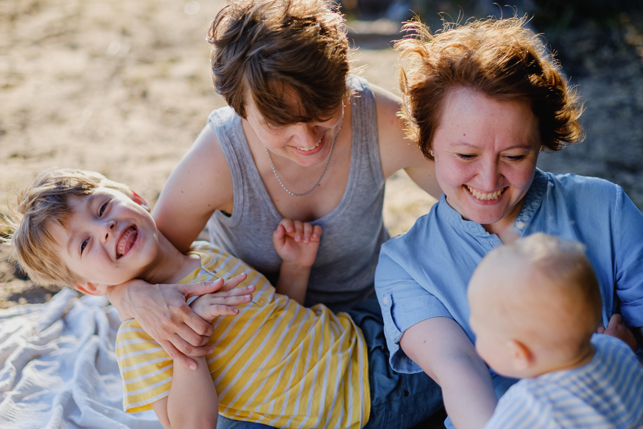
Principal investigators
Dr. Teresa Bennett, McMaster University
Dr. Irene Drmic, McMaster Children’s Hospital
Research has shown that access to services, social connections and parenting skills can influence families’ well-being in important ways. Despite this knowledge, Canadian autism services rarely ask about—or act upon—these known factors. The Family Check-Up program aims to change this reality. Parents first complete an assessment that helps the clinician to provide non-judgmental information about strengths and areas for improvement in parenting, as well as services in the community that could help the family. In addition, short sessions are available to help parents gain practical skills to address the specific challenges they’re facing.
Studies have found that the Family Check-Up often improves long-term child and caregiver mental health in families with non-autistic children, but we don’t yet know if it can be delivered effectively within an autism-service setting. To find out, this research team helped to establish a Family Check-Up clinical team within the McMaster Children’s Hospital Autism Program. They’re now studying whether the program reduces emotional and behavioural problems in autistic children and improves parent well-being. They’re also interviewing therapists and their supervisors to collect data about how best to implement the Family Check-Up into other autism centres.
Client-Oriented Mapping for Point of Care Access to Supports and Services (COMPASS)
A tool that makes it easier for clinicians to choose and communicate targeted recommendations for families when a child is diagnosed with fetal alcohol spectrum disorder (FASD)

Principal investigators
Dr. Jocelynn Cook, University of Ottawa
Dr. Jacqueline Pei, University of Alberta
Dr. Kaitlyn McLachlan, University of Guelph
Every person with fetal alcohol syndrome disorder (FASD) has their own strengths and challenges. That means there’s no one-size-fits-all pathway through the available supports and services. Instead, families have to figure out what makes the most sense given their child’s needs, age, goals and context.
Client-Oriented Mapping for Point of Care Access to Supports and Services (COMPASS) is a resource informed by nationwide data about the characteristics of individuals with FASD, their experiences, and the supports they’ve used at different stages of their lives (e.g. academic coaching, mental-health services, social-skills training, etc.) COMPASS aims to apply past learnings to new patients, so that FASD clinics can give meaningful, evidence-based recommendations to families when their child gets a diagnosis.
Having developed a COMPASS prototype, this team is working with the tech company Tactica to translate it into an automated format that will be easy to use. The next step will be piloting COMPASS with four partner clinics.
Fetal Alcohol Resource Program (FARP)
A bilingual program that provides service navigation and other forms of support for people with fetal alcohol spectrum disorder (FASD) and their families. It also equips service providers in the wider community to understand and address the needs of people with FASD

Principal investigators
Now active in three Ontario regions, FARP began as a navigation service, helping to connect people living with fetal alcohol spectrum disorder (FASD) and their families to existing programs in their communities. Now it supports families in other ways as well, such as providing them with FASD workers who can help them to get a diagnosis, understand the medical system, advocate for their children at school, and more.
FARP’s weekly and monthly support groups, including a book club and a therapeutic art group, reached a total of 603 children, youth, adults and caregivers this year.
In the wider community, FARP raises awareness of FASD and trains professionals from a variety of sectors (e.g. education, healthcare, mental health, criminal justice, child welfare and housing) about the disorder and how to improve the ways they serve people with FASD. This year, FARP’s team delivered 28 webinars to a total of 934 professionals. Having built a reputation for their trustworthy expertise, they’re even taking paid workshop requests from beyond their Ontario service regions.
The next steps include creating a package of training modules that would allow other communities to launch FARP programs without having to start from scratch.
F-Words Foundations
A course that encourages people to approach childhood disability with a focus on factors that are important for all kids’ healthy development, namely functioning, family, fitness, fun, friends and the future

Principal investigators
Dr. Peter Rosenbaum, CanChild
Dr. Andrea Cross, CanChild
Dr. Rachel Teplicky, CanChild
The F-words (Functioning, Family, Fitness, Fun, Friends and Future) are six key areas that this research team promotes as the main focus in childhood disability. Built upon the World Health Organization’s International Classification of Functioning, Disability and Health framework, they encourage everyone to think about factors that are important to any child’s development and well-being, such as their activities and environment. Introducing this way of thinking to families and service providers can result in measurable changes to self-reported family empowerment, parenting confidence, and experiences of family-centred service.
This project has made foundational F-Words training freely available across Canada by creating a self-paced online course in English and French. Over 1,000 people have accessed it so far. The researchers are currently evaluating its acceptability, feasibility and usability through online surveys and telephone interviews. Next, they will see how the online version’s effects compare to those of the facilitated version.






